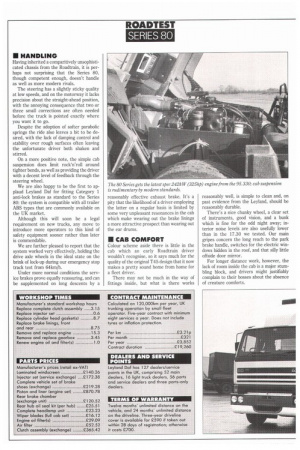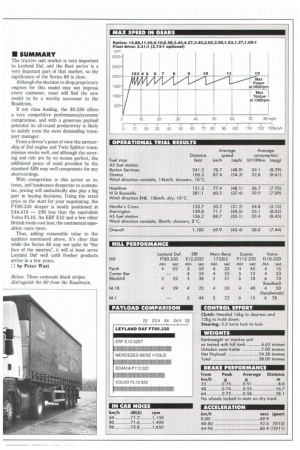• HANDLING
Page 40

Page 41

If you've noticed an error in this article please click here to report it so we can fix it.
Having inherited a comparitively unsophisticated chassis from the Roadtrain, it is perhaps not surprising that the Series 80, though competent enough, doesn't handle as well as more modern rivals.
The steering has a slightly sticky quality at low speeds, and on the motorway it lacks precision about the straight-ahead position, with the annoying consequence that two or three small corrections are often needed before the truck is pointed exactly where you want it to go.
Despite the adoption of softer parabolic springs the ride also leaves a bit to be desired, with the lack of damping control and stability over rough surfaces often leaving the unfortunate driver both shaken and stirred.
On a more positive note, the simple cab suspension does limit rock'n'roll around tighter bends, as well as providing the driver with a decent level of feedback through the steering wheel.
We are also happy to be the first to applaud Leyland Daf for fitting Category 1 anti-lock brakes as standard to the Series 80: the system is compatible with all trailer ABS types that are commonly available on the UK market.
Although this will soon be a legal requirement on new trucks, any move to introduce more operators to this kind of safety equipment sooner rather than later is commendable.
We are further pleased to report that the system worked very effectively, holding the drive axle wheels in the ideal state on the brink of lock-up during our emergency stop track test from 64km/h.
Under more normal conditions the service brakes prove equally reassuring, and can be supplemented on long descents by a reasonably effective exhaust brake. It's a pity that the likelihood of a driver employing the latter on a regular basis is limited by some very unpleasant resonances in the cab which make wearing out the brake linings a more attractive prospect than wearing out the ear drums.
• CAB COMFORT
Colour scheme aside there is little in the cab which an early Roadtrain driver wouldn't recognise, so it says much for the quality of the original T45 design that it now makes a pretty sound home from home for a fleet driver.
There may not be much in the way of fittings inside, but what is there works reasonably well, is simple to clean and, on past evidence from the Leyland, should be reasonably durable.
There's a nice chunky wheel, a dear set of instruments, good vision, and a bunk which is fine for the odd night away; interior noise levels are also usefully lower than in the 17.30 we tested. Our main gripes concern the long reach to the park brake handle, switches for the electric windows hidden in the roof, and that silly little offside door mirror.
For longer distance work, however, the lack of room inside the cab is a major stumbling block, and drivers might justifiably complain to their bosses about the absence of creature comforts. The tractive unit market is very important to Leyland Daf, and the fleet sector is a very imporant part of that market, so the significance of the Series 80 is clear.
Although the decision to drop proprietary engines for this model may not impress every customer, most will find the new model to be a worthy successor to the Roadtrain.
If not class leading, the 80.330 offers a very competitive performance/economy compromise, and with a generous payload potential its all-round productivity is likely to satisfy even the most demanding transport manager.
From a driver's point of view the partnership of Daf engine and Twin Splitter transmission works well, and although the steering and ride are by no means perfect, the additional peace of mind provided by the standard ABS may well compensate for any shortcomings.
With competition in this sector so intense, and businesses desperate to economise, pricing will undoubtedly also play a big part in buying decisions. Using the retail price as the start for your negotiating, the FT80.330 sleeper is neatly positioned at £44,410 £90 less than the equivalent Volvo FL10. An ERF E12 and a few other British rivals cost less; the continental opposition costs more.
Thus, adding reasonable value to the qualities mentioned above, it's clear that while the Series 80 may not quite be "the face of the nineties", it will at least serve Leyland Daf well until fresher products arrive in a few years.
LI by Peter Watt




















































































